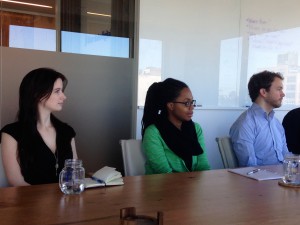Wednesday
Mandala ProjectsMindfulness and Compassionate Leadership
 Can Mindfulness Breed a New Generation of Compassionate Leaders?
Can Mindfulness Breed a New Generation of Compassionate Leaders?
by Lodro Rinzler
Recently there has been some good discussion in the media about how the term “mindfulness” is being co-opted, distanced from traditional Buddhist teachings that include compassion practices and more esoteric teachings such as those on emptiness. The discussion seems to raise a few questions: is mindfulness a trending topic because it makes us feel good about ourselves? If so, is that okay? Or is there a natural connection between the practice of meditation, a form of inner change, and societal transformation overall?
I’m a firm believer in that final notion. When I first started the Institute for Compassionate Leadership, I would outline to people the three main things we emphasize in our curriculum: meditation, community organizing training, and the types of leadership skills you simply don’t learn in university these days (fund-raising, negotiation, how to run a meeting). I would joke though, that even if none of the organizing or leadership skills landed with participants, after six months of meditating everyday I could pretty much guarantee they would still end up more compassionate leaders.
I could say this with certainty because I’ve seen the transformative power of meditation time and time again. I’ve been teaching meditation within the Buddhist tradition for thirteen or so years now. I’ve seen people come in, saying they are stressed out and can’t sleep or are going through a tough time personally and want meditation to help them. I’m cool with that. I give them the practice with some intro guidance and even in the span of a five week class I notice something shift.
I remember one Shambhala student, Bill, getting up during one of these classes and saying he didn’t have a question to ask but wanted to share a poem on being open-hearted. I gave him the floor. “Okay,” I said afterward, “Bill if I’m not mistaken you said a few weeks ago that you came here to handle your stress. That poem was just about how what you really want to do is to help others through being more present with them.”
 “Yeah. I guess it’s not just about me anymore,” Bill said. Through becoming more familiar with how he suffered at work, in his relationships, and in his community, Bill began to realize that everyone else he encountered suffered in related ways. Their story lines may look different but they were just as easily lured by passion, aggression, and ignorance as he was. He realized he wasn’t meditating just for his own sake, but so he could be present and open with other people he encountered. When meditating regularly, this shift toward compassionate activity is not uncommon.
“Yeah. I guess it’s not just about me anymore,” Bill said. Through becoming more familiar with how he suffered at work, in his relationships, and in his community, Bill began to realize that everyone else he encountered suffered in related ways. Their story lines may look different but they were just as easily lured by passion, aggression, and ignorance as he was. He realized he wasn’t meditating just for his own sake, but so he could be present and open with other people he encountered. When meditating regularly, this shift toward compassionate activity is not uncommon.
Meditation transforms you if you let it. It opens your heart, and makes you want to help the world. At the Institute for Compassionate Leadership we take young people from very diverse backgrounds who know they want to help the world already and do the reverse: we give them the daily meditation practice so they can become more self-aware. They begin to notice when they aren’t communicating effectively or listening enough or how they hold certain prejudices. Given that the common millennial switches jobs seven times while in their 20s, asking them to become more self-aware and focused on what meaningful work means to them is solving the millennial employment crisis in a way that no other leadership training organization has.
When we combine that work with the community organizing training and send our participants to go volunteer in their communities they do so from a place of empathy, not with the mindset of “I’m so good to be doing this let me help all you little people.” They realize that we all suffer, and want to help in whatever way makes sense in the circumstances they encounter. But the path begins with mindfulness practice.
 My most recent book, Walk Like a Buddha: Even if Your Boss Sucks, Your Ex is Torturing You, and You’re Hungover Again, could easily be judged by its cover. A conservative Buddhist might look at that title and not even open the book. But if they did they would see a purposeful bait and switch: the book opens with an intro to meditation and then sections on going out and dating but once we’ve covered some of that activity, we dive into two areas that can effect the world: bringing our meditation practice to social action and work. How can we bring an open heart into a world of tremendous suffering? How can we find work that is meaningful to us and in line with our desire to help others? These are the questions both the book and the Institute for Compassionate Leadership set out to answer.
My most recent book, Walk Like a Buddha: Even if Your Boss Sucks, Your Ex is Torturing You, and You’re Hungover Again, could easily be judged by its cover. A conservative Buddhist might look at that title and not even open the book. But if they did they would see a purposeful bait and switch: the book opens with an intro to meditation and then sections on going out and dating but once we’ve covered some of that activity, we dive into two areas that can effect the world: bringing our meditation practice to social action and work. How can we bring an open heart into a world of tremendous suffering? How can we find work that is meaningful to us and in line with our desire to help others? These are the questions both the book and the Institute for Compassionate Leadership set out to answer.
That being said, the book started with a pretty alluring hook: meditation and beers and sex. If beer and sex is what is on people’s minds and they think meditation can help with that, great. But if they stick with the practice they will find themselves transformed and will go on to become compassionate leaders. They will apply it to their workplace environment and become more actively involved in volunteer and community activities. We need more compassionate leaders in this world, and I’m okay with them starting out thinking meditation is stress-reduction, even though it’s really heart-opening.
~~
Learn more about the Institute for Compassionate Leadershipby clicking here.




